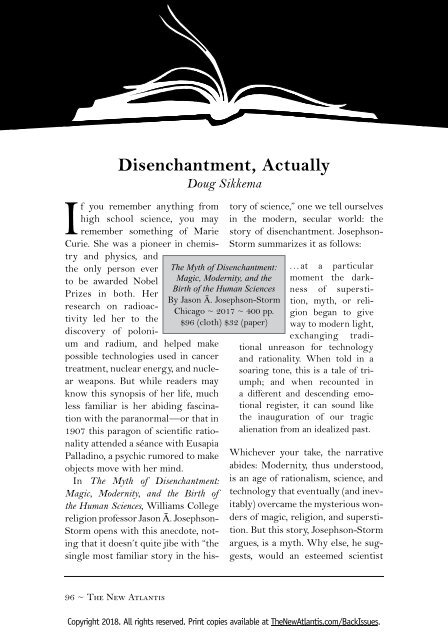The New Atlantis - Winter 2018 (Issue 54) uncompressed with cover
Create successful ePaper yourself
Turn your PDF publications into a flip-book with our unique Google optimized e-Paper software.
Disenchantment, Actually<br />
Doug Sikkema<br />
<strong>The</strong> Myth of Disenchantment:<br />
Magic, Modernity, and the<br />
Birth of the Human Sciences<br />
By Jason Ā. Josephson-Storm<br />
Chicago ~ 2017 ~ 400 pp.<br />
$96 (cloth) $32 (paper)<br />
If you remember anything from<br />
high school science, you may<br />
remember something of Marie<br />
Curie. She was a pioneer in chemistry<br />
and physics, and<br />
the only person ever<br />
to be awarded Nobel<br />
Prizes in both. Her<br />
research on radioactivity<br />
led her to the<br />
dis<strong>cover</strong>y of polonium<br />
and radium, and helped make<br />
possible technologies used in cancer<br />
treatment, nuclear energy, and nuclear<br />
weapons. But while readers may<br />
know this synopsis of her life, much<br />
less familiar is her abiding fascination<br />
<strong>with</strong> the paranormal — or that in<br />
1907 this paragon of scientific rationality<br />
attended a séance <strong>with</strong> Eusapia<br />
Palladino, a psychic rumored to make<br />
objects move <strong>with</strong> her mind.<br />
In <strong>The</strong> Myth of Dis enchantment:<br />
Magic, Modernity, and the Birth of<br />
the Human Sciences, Williams College<br />
religion professor Jason Ā. Josephson-<br />
Storm opens <strong>with</strong> this anecdote, noting<br />
that it doesn’t quite jibe <strong>with</strong> “the<br />
single most familiar story in the history<br />
of science,” one we tell ourselves<br />
in the modern, secular world: the<br />
story of disenchantment. Josephson-<br />
Storm summarizes it as follows:<br />
...at a particular<br />
moment the darkness<br />
of superstition,<br />
myth, or religion<br />
began to give<br />
way to modern light,<br />
exchanging traditional<br />
unreason for technology<br />
and rationality. When told in a<br />
soaring tone, this is a tale of triumph;<br />
and when recounted in<br />
a different and descending emotional<br />
register, it can sound like<br />
the inauguration of our tragic<br />
alienation from an idealized past.<br />
Whichever your take, the narrative<br />
abides: Modernity, thus understood,<br />
is an age of rationalism, science, and<br />
technology that eventually (and inevitably)<br />
overcame the mysterious wonders<br />
of magic, religion, and superstition.<br />
But this story, Josephson-Storm<br />
argues, is a myth. Why else, he suggests,<br />
would an esteemed scientist<br />
96 ~ <strong>The</strong> <strong>New</strong> <strong>Atlantis</strong><br />
Copyright <strong>2018</strong>. All rights reserved. Print copies available at <strong>The</strong><strong>New</strong><strong>Atlantis</strong>.com/Back<strong>Issue</strong>s.


